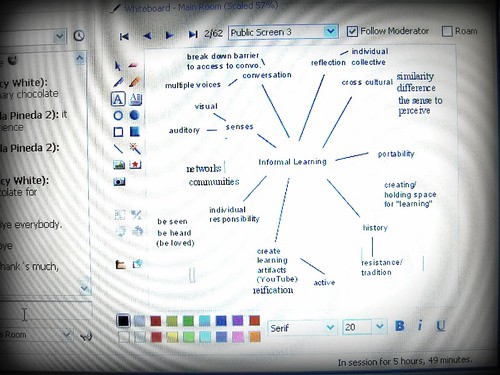 Today I took part in a small portion of a larger online/F2F event originating in Germany from LearnTec.
Today I took part in a small portion of a larger online/F2F event originating in Germany from LearnTec.
It was fun to trade ideas with Heike Philips, Dave Cormier and Jay Cross (and I am sorry Jennifer Jones was unable to chime in due to timing/home rhythms at the early time of day). We all were strong proponents of the value of conversation in learning (informal or otherwise) but I found myself backing off a bit and reminding myself that conversation is one of the three legs of my learning stool.
- Conversation – making meaning, getting different perspectives, trying out and testing ideas, challenging assumptions.
- Individual reflection – (because group reflection is a subset of conversation, no?) Stepping back, reviewing, observing, evaluating our own learning both in terms of process and content. Reflection provides us needed self awareness and the ideas we bring back into conversation.
- Reification – borrowing from Communities of Practice theory, what we create that expresses what we are learning or have learned. With internet tools makeing self publishing so easy, this area has blossomed – videos, images, blogs — things that manifest both our conversations and our reflections and put them out for wider consideration.
These three are a vortex, always intersecting with each other, even competing for our attention, eh? I wish I had paid more attention to reflection when I was younger. 😉
I have a habit of worshippping at the altar of conversation. But like all things, I must not let that blind me to other elements. It is in the interplay, the fluctuation between things, the margins, the tensions of what we know and don’t know, that learning happens.
Hi Nancy
I’ve just recently started following your blog and just wanted to say thanks for this one. A timely reminder to me not to mesmerised by wonderful conversations and my own reflections that I don’t “convert” my learning, however clumsily, into some sort of creation that expresses what I think – that way others can respond and we can compose something together.
Big Thank You!
Hi Nancy,
Thanks for clarifying this point for me. I was intrigued at what you said during our learning conversation and I actually wanted to ask you about it. Now, you just said it without me prompting.
Interestingly, in language learning we also encourage all three. Well, no, actually there is a fourth one too.
Conversation = sure, the ultimate goal is a conversation in the target language, so as to create meaning (this meaning could lead to closing sales)
Individual reflection = self-awareness as to why the interlocutor ‘didn’t seem to get it’ and most importantly intercultural issues
Reification = producing an email, a blog, a medical article, voicing a presentation, being able to talk on the phone etc. to demonstrate the things learned
May I ask where you would put the important aspect of learning from what we language experts call “authentic material”? Children learn by parrot phrasing, we learn a language by reading and listening to native speakers, articles in English, podcasts etc. ?
I am asking because I am just reflecting on what you said when I mentioned that I am so happy to converse with the experts of informal learning. And you mentioned that the term expert is outdated. Well, I am not sure anymore how you said it, still waiting for chat transcript, but to that effect. Again a new thought for me.
Heike
Phillip, I’m glad you are now “connected”
Heike, I’ve been thinking about your comment for a few days. I was not familiar with the idea of “authentic material” – from a communities of practice perspective where I learned the idea of reification there was the other side of participation. The parroting of songs or language, the reading of texts – I guess that is a form of participation.
As to experts –> I would reframe to think about passionate practitioners who like to converse with other passionate practitioners! 😉
Hi, Nancy!
Taking the springboard of your rhetorical question “group reflection is a subset of conversation, no?”, something I have observed in distributed communities is the importance of , often face to face, to tap and promote individual reflections and team learning that can then be brought into the wider conversation. And to elicit which issues in the wider conversation have important local resonances.
Local conversations seem to be particularly valuable when not all members are well versed on the tools used for the global conversation, or not extrovert enough to dive right into using them.
Thanks for this wonderful blog 🙂
Ben
BEN!!! So great to hear from you after a gap of years!
As I chew on your comment and two conversations yesterday, this issue of reflective PRACTICES keeps coming up. I am learning about scenario planning and the first piece is to understand your own mental models, assumptions etc. Again –> reflection. Over the next three days I’ll be facilitating some of those local, small conversations you talk about and I am going over and over again how I can create conditions and make the irresistible invitation into that reflective place.
In a conversation with a small group of online mavens (small, but not local), again, we were thirsting for reflection on our practices and how they intersected. Finally, on a CPSquare workshop call (medium sized, global), reflection on our own communities and what patterns show up similar or differently across them.
All of this required a breath, a step back and a safe place to reflect together. Then feed it back out/in to the wider system. So be it locally or globally, we need this practice. Like oxygen.
SOOOO good to hear from you again!
N